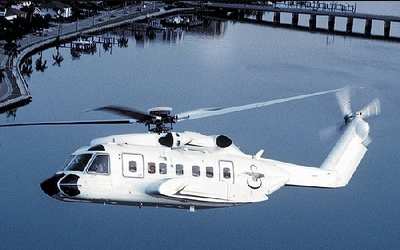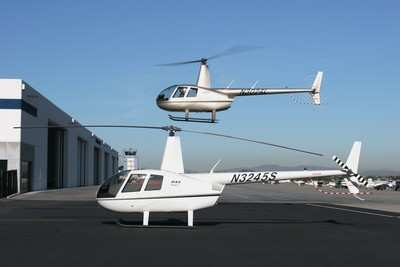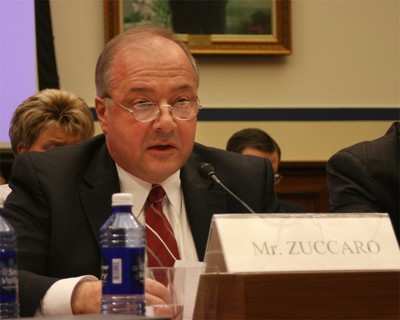Says Helicopters Should Be Considered Separate From Other
Aircraft
Helicopter Association International (HAI) President Matthew
Zuccaro testified Thursday before the US House of Representatives
Transportation and Infrastructure Committee’s Aviation
Subcommittee on the lack of merit the Bush Administration’s
financing proposal for the Federal Aviation Administration (FAA)
has for the civil helicopter industry.

Zuccaro told the committee he believes the current FAA funding
program is "fair, adequate, and equitable," pointing out to members
of the subcommittee it has been widely acknowledged that the
current funding mechanisms could adequately finance the Next
Generation Air Transportation System. Zuccaro told Aviation
Subcommittee Chairman Frank Costello (D-IL) and members of his
panel that the plan would have "an extremely detrimental economic
impact on HAI’s members, with a resulting constraint and/or
elimination of many helicopter operations."
Aviation panel members unanimously agreed the FAA’s plan
unfairly distributes cost, admonishing the FAA, "we’re not
going to allow it," "get ready -- we’re going to make good
decisions that embrace all of aviation." Congressman Robin Hayes
(R-North Carolina), a general aviation pilot, told government
witnesses, "The FAA is gulping the airline Kool-Aid."
 "How can one support a proposed
funding program that significantly reduces the costs to the
airlines, who in fact place the highest demands on the system,
while dramatically increasing costs to other segments, such as the
helicopter community, whose utilization of the system is
incidental, with little or no impact?" asked Zuccaro.
"How can one support a proposed
funding program that significantly reduces the costs to the
airlines, who in fact place the highest demands on the system,
while dramatically increasing costs to other segments, such as the
helicopter community, whose utilization of the system is
incidental, with little or no impact?" asked Zuccaro.
"The very nature of the helicopter’s capabilities, direct
point-to-point transportation, eliminates the need to operate to
and from airports, and helicopter industry initiatives such as
privately funded point-in-space, off- airport, instrument
approaches, further reduce airport use by helicopters," testified
Zuccaro.
Zuccaro pointed out that the missions performed, operational
altitudes, and locations of operations, are outside the reach of
the normal FAA Air Traffic Control service area and airport
infrastructure. Further, the current level of service the FAA
provides for initial certification as a commercial operator, i.e.,
an 18-month to two-year wait for an initial appointment is
unsatisfactory. It may well be indicative of the worsening level of
service customers can anticipate if the FAA reduces it’s
revenue by 600 million dollars under it’s proposed funding
program.
In his testimony, Zuccaro enlightened members of the panel on
the untold millions of dollars helicopter operators flying in
support of offshore operations in the Gulf of Mexico have spent to
provide their own infrastructure. He pointed out the fact the
"helicopter community has already stepped up to the plate" in the
form of a Memorandum of Agreement (MOA) co-signed between HAI and
the FAA, the helicopter operators, and the oil industry in the Gulf
of Mexico to facilitate the installation of Phase I of ADS-B
(Automatic Dependent Surveillance Broadcast) technology.

According to Zuccaro, the "value of the in-kind services being
provided by the helicopter industry, are valued in excess of 100
million dollars over the life of the project." "The airlines will
also reap the benefits of the new ADS-B system in the Gulf of
Mexico, yet the helicopter industry is the only industry segment
partnered with the FAA."
"The obvious fact," Zuccaro said, is that the "helicopter
community places the least demand on the Air Traffic Control and
airport system. The vast majority of their operations are conducted
at heliports, private facilities and remote locations, without
utilizing the services of FAA Air Traffic Control, or the need to
operate to and from airports."
Zuccaro asked panel members to give some thought to the FAA
compensating the helicopter community for services rendered due to
helicopters providing off airport, city center to city center
transportation, thereby further creating new capacity at congested
airports.

In his prepared statement, Zuccaro thanked FAA Administrator
Marion Blakey for her support and leadership, but he "respectfully
disagreed with her regarding the proposed funding methodology" that
would impose onerous financial burdens upon his industry.
"The helicopter community should be," Zuccaro said, the "one
segment of the aviation community that has the least economic
burden placed on it, and the airlines should have the highest."
Adding, "to do otherwise would be like charging a farm tractor that
only leaves the farm once a month, to travel on a public road a
short distance to go to another farm, the same highway tax as a
long haul tractor-trailer."

In closing, Zuccaro (above) recommended that helicopters be
placed into their own category of aircraft for planning and funding
purposes, instead of being combined with piston airplanes, as is
currently the case.
He further recommended that the majority of the funds
contributed by helicopter operators, under any funding program,
should not be applied to the development of airports and runways,
but instead should be utilized to fund a national heliport
system.
 ANN's Daily Aero-Term (05.05.25): Circle To Runway (Runway Number)
ANN's Daily Aero-Term (05.05.25): Circle To Runway (Runway Number) ANN's Daily Aero-Linx (05.05.25)
ANN's Daily Aero-Linx (05.05.25) NTSB Prelim: De Havilland DHC-1
NTSB Prelim: De Havilland DHC-1 Classic Aero-TV: The Boeing Dreamliner -- Historic First Flight Coverage
Classic Aero-TV: The Boeing Dreamliner -- Historic First Flight Coverage Airborne-NextGen 05.06.25: AF Uncrewed Fighters, Drones v Planes, Joby Crew Test
Airborne-NextGen 05.06.25: AF Uncrewed Fighters, Drones v Planes, Joby Crew Test







